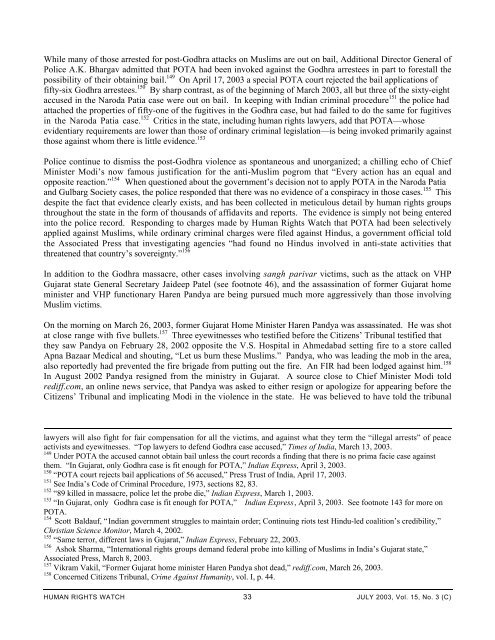We Have No Orders to Save You - Human Rights Watch
We Have No Orders to Save You - Human Rights Watch
We Have No Orders to Save You - Human Rights Watch
You also want an ePaper? Increase the reach of your titles
YUMPU automatically turns print PDFs into web optimized ePapers that Google loves.
While many of those arrested for post-Godhra attacks on Muslims are out on bail, Additional Direc<strong>to</strong>r General of<br />
Police A.K. Bhargav admitted that POTA had been invoked against the Godhra arrestees in part <strong>to</strong> forestall the<br />
possibility of their obtaining bail. 149 On April 17, 2003 a special POTA court rejected the bail applications of<br />
fifty-six Godhra arrestees. 150 By sharp contrast, as of the beginning of March 2003, all but three of the sixty-eight<br />
accused in the Naroda Patia case were out on bail. In keeping with Indian criminal procedure 151 the police had<br />
attached the properties of fifty-one of the fugitives in the Godhra case, but had failed <strong>to</strong> do the same for fugitives<br />
in the Naroda Patia case. 152 Critics in the state, including human rights lawyers, add that POTA—whose<br />
evidentiary requirements are lower than those of ordinary criminal legislation—is being invoked primarily against<br />
those against whom there is little evidence. 153<br />
Police continue <strong>to</strong> dismiss the post-Godhra violence as spontaneous and unorganized; a chilling echo of Chief<br />
Minister Modi’s now famous justification for the anti-Muslim pogrom that “Every action has an equal and<br />
opposite reaction.” 154 When questioned about the government’s decision not <strong>to</strong> apply POTA in the Naroda Patia<br />
and Gulbarg Society cases, the police responded that there was no evidence of a conspiracy in those cases. 155 This<br />
despite the fact that evidence clearly exists, and has been collected in meticulous detail by human rights groups<br />
throughout the state in the form of thousands of affidavits and reports. The evidence is simply not being entered<br />
in<strong>to</strong> the police record. Responding <strong>to</strong> charges made by <strong>Human</strong> <strong>Rights</strong> <strong>Watch</strong> that POTA had been selectively<br />
applied against Muslims, while ordinary criminal charges were filed against Hindus, a government official <strong>to</strong>ld<br />
the Associated Press that investigating agencies “had found no Hindus involved in anti-state activities that<br />
threatened that country’s sovereignty.” 156<br />
In addition <strong>to</strong> the Godhra massacre, other cases involving sangh parivar victims, such as the attack on VHP<br />
Gujarat state General Secretary Jaideep Patel (see footnote 46), and the assassination of former Gujarat home<br />
minister and VHP functionary Haren Pandya are being pursued much more aggressively than those involving<br />
Muslim victims.<br />
On the morning on March 26, 2003, former Gujarat Home Minister Haren Pandya was assassinated. He was shot<br />
at close range with five bullets. 157 Three eyewitnesses who testified before the Citizens’ Tribunal testified that<br />
they saw Pandya on February 28, 2002 opposite the V.S. Hospital in Ahmedabad setting fire <strong>to</strong> a s<strong>to</strong>re called<br />
Apna Bazaar Medical and shouting, “Let us burn these Muslims.” Pandya, who was leading the mob in the area,<br />
also reportedly had prevented the fire brigade from putting out the fire. An FIR had been lodged against him. 158<br />
In August 2002 Pandya resigned from the ministry in Gujarat. A source close <strong>to</strong> Chief Minister Modi <strong>to</strong>ld<br />
rediff.com, an online news service, that Pandya was asked <strong>to</strong> either resign or apologize for appearing before the<br />
Citizens’ Tribunal and implicating Modi in the violence in the state. He was believed <strong>to</strong> have <strong>to</strong>ld the tribunal<br />
lawyers will also fight for fair compensation for all the victims, and against what they term the “illegal arrests” of peace<br />
activists and eyewitnesses. “Top lawyers <strong>to</strong> defend Godhra case accused,” Times of India, March 13, 2003.<br />
149 Under POTA the accused cannot obtain bail unless the court records a finding that there is no prima facie case against<br />
them. “In Gujarat, only Godhra case is fit enough for POTA,” Indian Express, April 3, 2003.<br />
150 “POTA court rejects bail applications of 56 accused,” Press Trust of India, April 17, 2003.<br />
151 See India’s Code of Criminal Procedure, 1973, sections 82, 83.<br />
152 “89 killed in massacre, police let the probe die,” Indian Express, March 1, 2003.<br />
153 “In Gujarat, only Godhra case is fit enough for POTA,” Indian Express, April 3, 2003. See footnote 143 for more on<br />
POTA.<br />
154 Scott Baldauf, “Indian government struggles <strong>to</strong> maintain order; Continuing riots test Hindu-led coalition’s credibility,”<br />
Christian Science Moni<strong>to</strong>r, March 4, 2002.<br />
155 “Same terror, different laws in Gujarat,” Indian Express, February 22, 2003.<br />
156 Ashok Sharma, “International rights groups demand federal probe in<strong>to</strong> killing of Muslims in India’s Gujarat state,”<br />
Associated Press, March 8, 2003.<br />
157 Vikram Vakil, “Former Gujarat home minister Haren Pandya shot dead,” rediff.com, March 26, 2003.<br />
158 Concerned Citizens Tribunal, Crime Against <strong>Human</strong>ity, vol. I, p. 44.<br />
HUMAN RIGHTS WATCH 33 JULY 2003, Vol. 15, <strong>No</strong>. 3 (C)

















